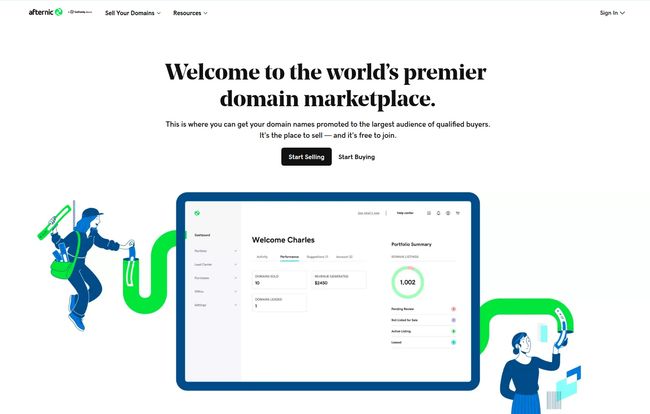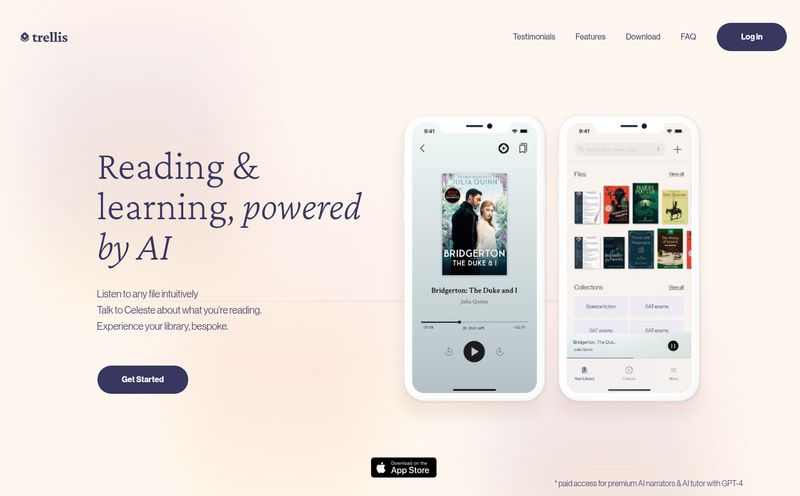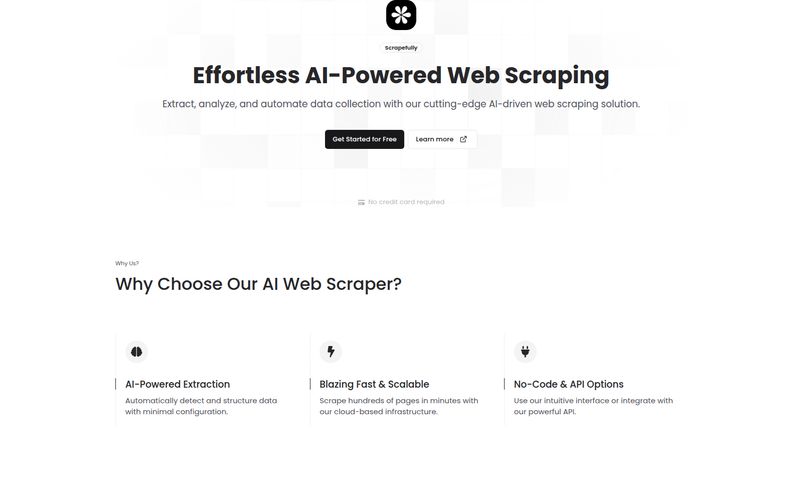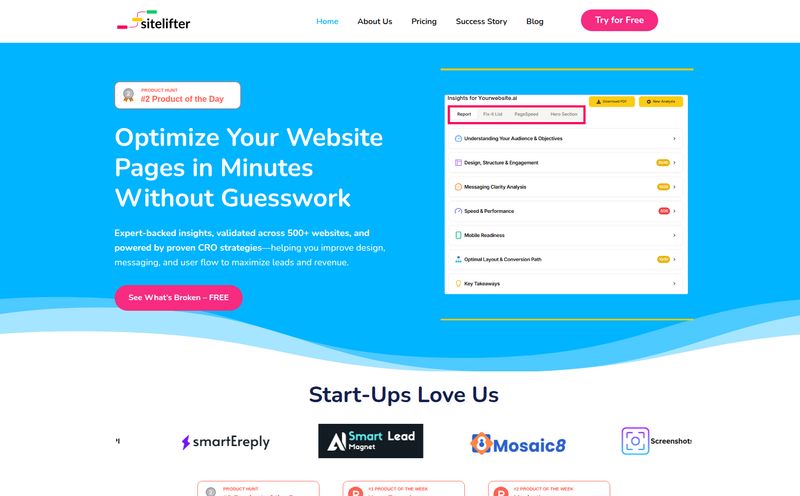I spend an unhealthy amount of time trawling the internet for the next big thing in SEO and app marketing. You know the drill. You're 17 tabs deep, fueled by lukewarm coffee, and your eyes start to glaze over from all the marketing-speak. But every so often, you find something that makes you sit up straight. A little glimmer of genius. The other day, that glimmer was a tool called Appastic.
The concept was brilliant. An AI-powered tool designed to do one thing, and do it well: analyze app reviews. It promised to sift through the mountains of user feedback on the App Store and Google Play, pull out the real insights, and tell you exactly what your users are screaming for. My inner marketing nerd was buzzing. We all know that user feedback is gold, but manually reading thousands of reviews is... well, it's a soul-crushing task. This felt like the answer.
But then, things got weird. As I went to check it out, I hit a dead end. A very expensive-looking dead end. The story of Appastic isn't just a review; it's a mystery and, just maybe, an opportunity.
So, What Was Appastic Supposed To Be?
Let's talk about the ghost in the machine. Based on the digital breadcrumbs I found, Appastic was designed to be a developer's best friend. It wasn't just another dashboard with vanity metrics. It was pitched as an intelligent system to simplify the whole app success cycle by focusing on what actually matters—your users' unfiltered opinions.
Imagine launching a new feature and instead of guessing its reception, you get a clear, AI-driven report on user sentiment. Are people thrilled? Frustrated? Is there a bug that only affects users on a specific device? That’s the problem Appastic aimed to solve. It’s not just data; it’s direction. For anyone who's ever managed an app, you know that's the holy grail.
Its Promised Features Were Spot On
The feature set was lean, mean, and exactly what the market needs. No fluff, just pure utility.
- AI-Powered Review Analysis: This is the core engine. The idea is to go beyond simple keyword matching and understand the intent and emotion behind a review. Is the user's "request" for a new feature sarcastic or genuine? A good AI could tell the difference.
- Sentiment Tracking: A simple but powerful feature. Tracking your app's overall sentiment score over time is a vital health metric. If you see a sudden dip after an update, you know you have a problem, and the AI could pinpoint why by flagging the most common negative topics.
- Actionable Insights & Guidelines: Here’s where it gets really good. Appastic promised not just to show you the problems but to give you “Step by Step Guidelines.” That’s a bold claim. It suggests the tool wouldn't just be a passive dashboard but an active consultant, turning raw feedback into a prioritized to-do list for your dev team.
- Cross-Platform Support: It was built for both the Google Play Store and Apple App Store, which is essentail. Managing two different feedback streams is a headache, and consolidating them is a no-brainer.
Why App Review Analysis is a Non-Negotiable in 2024
Let's take a step back. Some people might think, "Reviews? I just look at the star rating." If that's you, you're leaving money on the table. A lot of it. Your reviews are the most direct, honest, and free source of market research you will ever get. They are a direct line to your user’s brain.
In my experience, a dedicated review analysis strategy directly impacts:
- Your Product Roadmap: Stop guessing what features to build next. Your users are literally telling you what they'll pay for.
- User Retention and Churn: People don't just leave an app silently. They often leave a scathing 1-star review on their way out, detailing the exact reason. Fixing those issues is the fastest way to reduce churn.
- App Store Optimization (ASO): The app stores' algorithms pay attention to review volume, velocity, and sentiment. Happy, engaged users lead to better visibility. It's a beautiful, self-perpetuating cycle.
Ignoring this stuff is like trying to navigate a ship in the dark with no compass. A tool like Appastic is the compass, the sonar, and the lookout all rolled into one.
The Proposed Pricing: Fair or Fantasy?
Okay, so the concept is solid. But what about the cost? The pricing tiers I unearthed were actually quite clever. They seem to understand that a solo indie dev has different needs (and pockets) than a major corporation.
| Plan | Price | Key Limit | Ideal For |
|---|---|---|---|
| Basic | $15/month | Up to 1,000 reviews/app | Indie developers or new apps |
| Plus | $29/month | Up to 10,000 reviews/app | Growing apps with medium traffic |
| Premium | $49/month | Unlimited reviews | Established apps and agencies |
Honestly, this is a perfectly reasonable structure. The review-based pricing makes sense, although it could be a con for apps that go viral overnight. Still, $49 for unlimited reviews and AI analysis? For a successful app, that's a drop in the bucket. It's less than you'd spend on a team lunch. The value proposition is definitely there.
The Twist: Appastic.com is For Sale
So, I'm sold on the idea. I'm ready to sign up for the free trial, kick the tires, and maybe even write a glowing review. I navigate to appastic.com, and I get... this:

Visit Appastic
A GoDaddy landing page. The domain is registered, but it's for sale. Powered by Afternic, a domain marketplace. My heart sank a little. This brilliant tool doesn't exist. It's a ghost. A concept, an idea, a set of slides in a pitch deck, perhaps?
What happened here? Was it a startup that ran out of funding before it could launch? A side project that someone lost passion for? Or, and this is my favorite theory, is someone selling the idea itself, neatly packaged with a brandable domain name? It's a fascinating digital mystery.
Could This Be Your Golden Ticket?
Here’s where I lean in and talk directly to the entrepreneurs, the indie hackers, and the ambitious dev teams reading this. This isn't just a dead end; it's a blueprint. Someone has already done the conceptual work. They've identified a clear pain point, designed a solution, spec'd out the features, and even figured out a plausible pricing model.
The concept is validated. The need is real. The domain is—apparently—available for the right price. For a team with the technical chops to build the AI backend, this is a ready-made business in a box. It's a huge head start. I’ve seen startups built on far less than this.
Frequently Asked Questions about Appastic
- What was Appastic supposed to do?
- Appastic was conceptualized as an AI-powered tool to analyze user reviews from the Apple App Store and Google Play Store, providing sentiment tracking and actionable insights to help developers improve their apps.
- Why is analyzing app reviews so important?
- App reviews are a direct line to your users. Analyzing them helps you create a better product roadmap, identify critical bugs, reduce user churn, and improve your app's visibility in the app stores (ASO).
- Is the Appastic tool actually available to use?
- No. As of late 2023, the domain name appastic.com is listed for sale, indicating the tool was likely never launched or was discontinued. The product itself does not appear to exist publicly.
- What were the proposed Appastic pricing tiers?
- The proposed pricing was a three-tiered model: Basic at $15/month (1,000 reviews), Plus at $29/month (10,000 reviews), and Premium at $49/month (unlimited reviews).
- Could someone else build a tool like Appastic?
- Absolutely. The core concept is strong and addresses a real need in the app development community. A skilled developer or team could certainly build a similar service. The market is ripe for it.
Final Thoughts on a Brilliant Ghost
The story of Appastic is a strange one. It’s a reminder that a great idea is only the first step. Execution is everything. While we can't review the tool itself, we can absolutely admire the thinking behind it. It serves as a perfect case study of a product designed to solve a real, nagging problem for a clearly defined audience.
And who knows? Maybe someone reading this will be the one to pick up the torch. Maybe the next time I check, appastic.com won't be a 'for sale' page, but a login screen. A guy can dream, can't he?
Reference and Sources
- Domain Sale Information: Afternic by GoDaddy
- App Store Ecosystem: Apple App Store
- Google Play Ecosystem: Google Play Store



